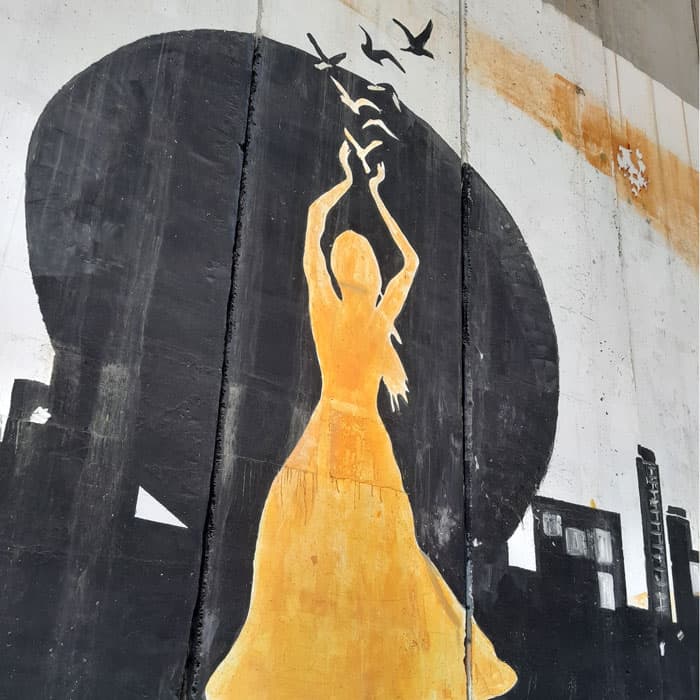The Churches for Middle East Peace coalition seeks to heal divisions and to support the oldest Christian community in the world.
For more than 25 years, Maryknoll missioners have looked to a group called Churches for Middle East Peace (CMEP) to provide ways for them to contribute to peace in the Holy Land. Especially at this time of deep division and violence between Israelis and Palestinians, our faith calls us not to lose hope but remain steadfast in our commitment to peace and justice.
Thirty-four Christian denominations and organizations in the United States, including the Maryknoll Office for Global Concerns, form the CMEP coalition based on their shared commitment to pursuing security, justice and equality in Palestine, Israel and the broader Middle East.
“They’ve come together from different perspectives, conservative and liberal, to agree upon multiple policy positions in the pursuit of lasting peace,” says the Rev. Dr. Mae Elise Cannon, executive director of CMEP. “We meet regularly with the White House, senators, representatives, the State Department, and even heads of state. We’ve had the opportunity to speak and educate at the United Nations and at other global forums.”
Kyle Cristofalo, CMEP senior director of advocacy in Washington, D.C., says CMEP has three advocacy priorities: holistic peace building, humanitarian economic assistance and human rights.
Maryknoll Sister Susan Nchubiri has worked closely with Cristofalo this past year, after the missioner gained experience in Jerusalem as part of an international team organized by the World Council of Churches. The team offered a protective presence to vulnerable communities, monitoring and reporting human rights abuses.
“CMEP’s annual advocacy summits in Washington, D.C., are a great opportunity for people of faith to come to the Capitol and speak to their congresspeople,” says Sister Nchubiri, who attended the summit last April.
CMEP does more than just advocacy, however. “We want to educate American Christians about what is happening in the Middle East,” Dr. Cannon says. “We travel with Israelis and Palestinians. We bring them to the United States to talk about their experiences and their realities.” CMEP has also produced videos to share these voices with church audiences.
“Israelis are afraid,” says Tania Hary, executive director of Gisha, an Israeli nonprofit organization founded in 2005 whose goal is to protect the freedom of movement of Palestinians, especially Gaza residents.
In 2005, the Israeli government decided to dismantle settlements and evacuate Israeli settlers and the army from inside Gaza in response to attacks on Israeli civilians by Palestinian militants. The purpose of the plan, according to then-Prime Minister Ariel Sharon, was to improve Israel’s security in the absence of peace negotiations with the Palestinians.

Artists have painted messages of resilience and hope on the concrete wall separating Bethlehem and Jerusalem, built to segregate Palestinians. (Susan Nchubiri/Palestine)
The United Nations considers Gaza to be still under military occupation by Israel, a point disputed by Israel. Since the withdrawal in 2005, Israel continues to maintain direct control over Gaza’s air and maritime space, six of Gaza’s seven land crossings and the Palestinian population registry. Many Gazans say what is most taxing is Israel’s control of their movement in and out of the enclave and their forced dependence on Israel for water, electricity, telecommunications and other utilities.
“As Palestinians, every aspect of our life is controlled by Israeli military orders and regulations,” says Sami Awad, founder and former executive director of Holy Land Trust. Awad, the nephew of Nonviolence International’s founder Mubarak Awad, was born in the United States to Palestinian parents and received a doctorate in divinity from Chicago Theological Seminary. He began the Holy Land Trust in Bethlehem in 1998 to strengthen and empower the Palestinian community to develop nonviolent approaches to resisting oppression and building a peaceful future.
Rabbi Naamah Kelman, the first ordained female rabbi in Israel, also spoke in a CMEP video of nonviolent principles for transforming conflict. “We are all survivors of trauma and the more we hear of each other’s suffering, the more we might be able to move forward,” she says.
Churches for Middle East Peace organizes “pilgrimage to peace” tours to bring people from the United States to the Holy Land to meet inspiring people like Hary, Awad and Rabbi Kelman and to gain a deeper understanding of the issues. “Once you see injustice visited upon children, once you see the wall and go through a checkpoint, it really changes your perspective,” Sister Nchubiri says.
Another aspect of CMEP’s work is to support the Christian community in Jerusalem, the West Bank and Gaza, which constitutes the oldest Christian community in the world, dating back to the first century.
Before the horrific Oct. 7 attack by Hamas in Israel and subsequent Israeli bombardment and siege of Gaza, the Christian community in Gaza included approximately 1,000 people from Orthodox, Catholic, Episcopalian and Protestant traditions. The Armenian and Latin patriarchs have both stated that the level of death and destruction has reached a degree that threatens to completely eradicate the Christian community in Gaza.
“We hear regularly from our friends and brothers and sisters in the Holy Land about how difficult their current realities are, and yet they do not give up hope,” Dr. Cannon says. “We can support their work by encouraging them, praying for them, and advocating on their behalf in the United States.”
Because, Dr. Cannon says, “engaging in the work of human rights and advocating for justice is a discipleship journey for those of us who choose to follow Jesus.”
Featured image: Residents of Silwan in East Jerusalem express sorrow as their ancestral home, belonging to their family for 200 years, is destroyed. A court order allowed the municipal council, settler organization and border police to demolish the house. The family was given only an hour to remove their belongings. (Susan Nchubiri/Palestine)
![]()

